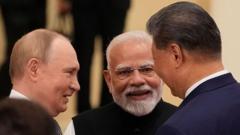Can Oil Unite Russia, China, and India?

Published: 2025-09-02 09:50:13 | Category: technology
The recent meeting between Russian President Vladimir Putin, Chinese President Xi Jinping, and Indian Prime Minister Narendra Modi at the Shanghai Co-operation Organisation (SCO) summit illustrates a growing bond among these nations, particularly regarding energy trade. With the backdrop of Western sanctions against Russia following its invasion of Ukraine, both India and China are increasingly reliant on Russian oil, which has become more affordable due to these geopolitical shifts.
Last updated: 10 October 2023 (BST)
Key Takeaways
- Russia's oil exports to India and China have surged since the 2022 Ukraine invasion.
- Western sanctions have made Russian oil cheaper, attracting both nations.
- The SCO summit served as a platform for strengthening ties amid economic uncertainty.
- India's purchases of Russian oil have significantly increased, benefitting from lower costs.
- China aims to showcase itself as a counterbalance to US influence at the summit.
Contextual Overview of the SCO Summit
The SCO summit held in Tianjin marked a significant moment for Russia, India, and China, three countries with a complex relationship shaped by historical rivalries and shared interests. The summit is part of a broader effort to challenge the dominance of Western nations, particularly the United States, in global geopolitics. As these leaders convened, they sought to reinforce their economic and strategic ties, which have become increasingly vital amid the shifting landscape of international relations.
Russia's Energy Strategy and Economic Dependence
Russia relies heavily on oil and gas exports, which account for approximately 25% of its budget revenues. The invasion of Ukraine and the subsequent imposition of sanctions by Western countries have forced Moscow to pivot towards Asia, seeking to solidify its economic partnerships with India and China. This shift has resulted in an unprecedented increase in oil exports to these nations.
Growing Oil Exports to China and India
In 2022, China imported over 100 million tonnes of Russian crude oil, representing nearly 20% of its total energy imports. This surge was largely driven by the price drop following Western sanctions, making Russian oil an attractive option for the world's most populous nation. Similarly, India, which previously imported only a fraction of its oil from Russia, has seen its imports skyrocket, with purchases reaching approximately £103.5 billion since the invasion.
Economic Benefits for India and China
Both India and China have capitalised on the opportunity to secure cheaper energy supplies from Russia. Indian refiners have benefitted from lower costs, as Russian oil is often less expensive than alternatives from the Middle East. This strategic pivot has allowed India to enhance its energy security while simultaneously garnering economic advantages.
The Geopolitical Landscape and Its Implications
The strategic partnership among Russia, India, and China is increasingly viewed as a counterweight to US influence. Following the imposition of tariffs and sanctions by the US, India has found itself in a precarious position, navigating its historical ties with Washington while seeking beneficial trade arrangements with Moscow. The recent tariffs imposed by the Trump administration have strained India-US relations, prompting New Delhi to reaffirm its commitment to acquiring energy from Russia.
India's Political Calculations
Prime Minister Modi's government is keen to portray its stance as one of defiance against US pressure. By strengthening ties with Russia, Modi not only secures a vital energy source but also bolsters his domestic image as a leader unafraid to challenge external pressures. This political dynamic is crucial as India seeks to maintain its sovereignty in foreign policy while grappling with the complex web of international relations.
China’s Role in the SCO and Energy Negotiations
China, too, is motivated to protect its energy interests. As it negotiates with the US to avoid escalating tariffs, the summit serves as an opportunity to reaffirm its position as a key player in the region. The alignment with Russia and India at the SCO reinforces China's narrative of promoting a multi-polar world order, in which power is distributed among several major nations rather than concentrated in the hands of the US.
Challenges Ahead for Russia
Despite the burgeoning trade relations, challenges remain for Russia. As it seeks to deepen ties with India, it may have to offer further discounts on oil to maintain competitiveness against other suppliers. The evolving dynamics of trade between Russia, India, and China will be crucial as each nation navigates its own economic interests and geopolitical objectives.
The Future of the Russia-India-China Dynamic
The ongoing collaboration among Russia, India, and China reflects a significant shift in the global energy landscape. As these nations continue to pursue mutual economic interests, the implications for international relations and global energy markets could be profound. The success of this partnership will largely depend on how each country manages its external relationships, particularly with the US and other Western nations.
Conclusion: What Lies Ahead?
The SCO summit signifies a critical juncture for Russia, India, and China as they navigate their intertwined fates in a rapidly changing world. With the backdrop of economic pressures and the influence of the US, the future of this tripartite relationship remains uncertain. However, the commitment to increasing trade and energy cooperation suggests that these nations are poised to continue their collaboration in the face of external challenges.
As the world watches these developments, the question remains: how will this trilateral partnership evolve in response to shifting geopolitical landscapes? #Russia #India #China
FAQs
What is the Shanghai Co-operation Organisation (SCO)?
The SCO is a regional forum aimed at promoting economic and political co-operation among its member states, which include China, India, and Russia, among others. It seeks to provide an alternative to Western-led organisations.
Why has Russian oil become cheaper for India and China?
Western sanctions imposed on Russia following its invasion of Ukraine have led to a significant decrease in Russian oil prices, making it more affordable for countries like India and China to purchase.
What impact do US tariffs have on India-Russia relations?
The US has imposed tariffs on countries buying Russian oil, which has strained India-US relations. In response, India has chosen to strengthen its ties with Russia for energy security.
How much Russian oil does China import?
In 2022, China imported over 100 million tonnes of Russian crude oil, making it a major component of its total energy imports, accounting for nearly 20%.
What are the implications of the Russia-India-China partnership?
This partnership could reshape global energy dynamics and challenge US influence, as these nations seek to enhance their economic ties and promote a multi-polar world order.



